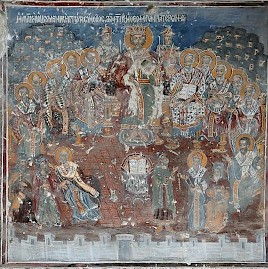Ecclesiastical Council
Council (or synod): meeting of the bishops of the church to discuss theological and organizational matters.

In every organization, differences of opinion are bound to arise, and the church is no exception. On many occasions, leading Christians have come together to discuss their differences. The first of these meetings is the debate that took place in 49/50 in Jerusalem; those who were present discussed whether non-Jewish Christians should follow the Law of Moses. The apostle Paul thought that this was not necessary, and it was decided that they ought to abstain from the pollution of idols, from sexual immorality, from what is strangled, and from blood.note
This meeting was the model of later councils. First, there was a question that was so important that local leaders could not solve it; then, a meeting was organized; those who were present discussed the matter; and in the end, a decision was made, and an aspect of orthodox teaching was written down. It is important to note that there was no equivalent for this practice in the religions of the pagans, who were more or less free to choose their beliefs.
Three types of Council can be discerned:
- Particular Councils: organized by the bishops of one province to discuss local affairs (e.g. Edessa 197, Arles 313, Orange 529);
- General or Ecumenical Councils: organized by an emperor to establish orthodox belief; once the bishop of Rome had recognized the decisions, they were accepted as binding and enforced as if they were imperial laws; only seven are generally recognized;
- Councils that were meant as Ecumenical Councils but failed and are, therefore, not recognized (e.g., 343/344 Serdica and 359 Rimini).
At the First Ecumenical Council of Nicaea, the bishops received instructions to organize particular councils as often as possible. In several provinces, like Asia and Africa, this had already become a common practice. In the centuries after the fall of the Roman empire, the frequently held particular councils were important events in which the Germanic kings were able to create consensus in their territories. For example, in the Kingdom of Toledo, ruled by kings of Visigothic descent, at least seventeen councils took place, in which all kind of religious and secular problems were discussed.
The seven Ecumenical Councils are:
- Nicaea (325)
- Constantinople I (381)
- Ephesus (431)
- Chalcedon (451)
- Constantinople II (553)
- Constantinople III (680)
- Nicaea II (787)